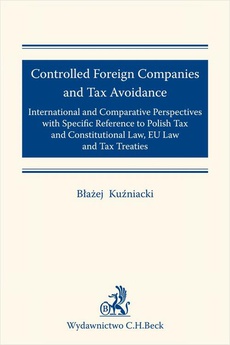INNE EBOOKI AUTORA

-22%
Capitalism and political power
Autor:
Wydawca:
Format:
pdf, ibuk
"Capitalism and Political Power" presents the author’s research spanning economics, law and politics. Its central idea is that governments need two components to consolidate their position: legitimation and economic power. Legitimation is conferred by popular support, and economic power is based on natural, temporary possession of capital. This concept draws on Nouriel Roubini and Jeffrey Sachs’ seminal research and on George Tsebelis’ political theory, looking at political systems as structures formed by separate political agents – “veto players”. Substantial evidence is provided that the more complex the political system is, the more capital it holds, and that the government has only a relative impact on redistribution of capital, decreasing ever since the mid-1980s, as political systems began to move towards simplification and standardization.
Krzysztof Waśniewski (b. 1968), Doctor of Economics, Assistant Professor at the Faculty of Management of the Andrzej Frycz Modrzewski Cracow University in Cracow, Poland. His interests, which earlier focused on corporate strategies, now also include institutional economics and other social disciplines such as law, political sciences and sociology.
| Rok wydania | 2017 |
|---|---|
| Liczba stron | 214 |
| Kategoria | Zarządzanie, organizacja, strategie |
| Wydawca | Wydawnictwo Naukowe Scholar |
| ISBN-13 | 978-83-7383-882-6 |
| Numer wydania | 1 |
| Język publikacji | polski |
| Informacja o sprzedawcy | ePWN sp. z o.o. |
POLECAMY
Ciekawe propozycje
Spis treści
| Contents | |
| Introduction | 7 |
| Chapter 1. The constitutional state as a functional technology | 11 |
| 1.1. The classical, sociological canon set by Emile Durkheim | |
| and Max Weber | 15 |
| 1.2. Fernand Braudel and the “set of sets” theory | 19 |
| 1.3. Jurgen Habermas and discursive politics | 22 |
| 1.4. The utilitarian view of the state | 25 |
| 1.5. Thomas Malthus and the demographic factor | 28 |
| 1.6. The theory of social contract: Rousseau and Rawls | 30 |
| 1.7. Herbert Hart’s theory of law | 33 |
| 1.8. The division of powers in political systems | 35 |
| 1.9. Attempt at the classification of political systems | 38 |
| 1.10. The economic role of political institutions | |
| and Barry Weingast’s theory | 40 |
| 1.11. Recent evolution in political systems and in international | |
| relations | 45 |
| 1.12. Changes in international law | 49 |
| 1.13. Migrations | 53 |
| 1.14. International aid as an aspect of international relations | 55 |
| 1.15. Investor-state disputes and international law | 61 |
| 1.16. A tentative conclusion: political systems seen as technologies | |
| with a lifecycle based on efficiency | 73 |
| Chapter 2. The fiscal function of constitutional states | 90 |
| 2.1. The main fiscal trends observable in the sample of 77 countries | 96 |
| 2.2. Bank lending, private debt and public debt | 102 |
| 2.3. The general issue of public debt | 103 |
| 2.4. Types and clusters of political systems in the sample | |
| of 77 countries | 118 |
| 2.5. Fiscal stances typical for political systems | 121 |
| 2.6. Conclusion – the institutional foundations of capital appropriation | |
| in political systems | 133 |
| Chapter 3. Changes in the ways that capitalism works | 137 |
| 3.1. Environmental challenges | 138 |
| 3.2. Accumulation and depreciation of capital stock in the global | |
| economy | 146 |
| 3.3. The velocity of money | 149 |
| 3.4. The velocity of money and financial markets | 159 |
| 3.5. National case studies | 167 |
| 3.5.1. United States | 169 |
| 3.5.2. Bolivia | 171 |
| 3.5.3. New Zealand | 175 |
| 3.5.4. Mexico | 181 |
| 3.5.5. Israel | 184 |
| Concluding remarks | 187 |
| Bibliography | 199 |
| Index of names | 210 |
| List of Tables | 213 |
| List of Figures | 214 |


























